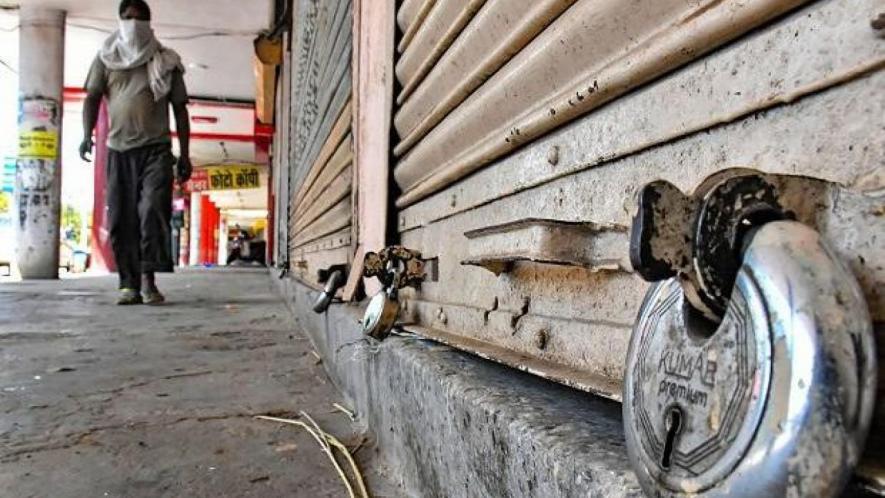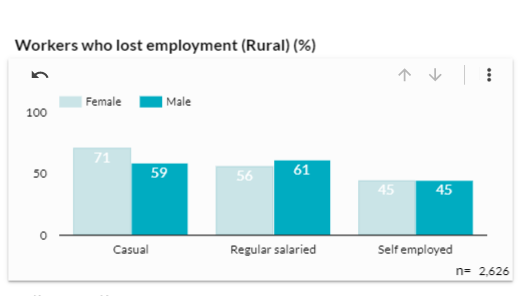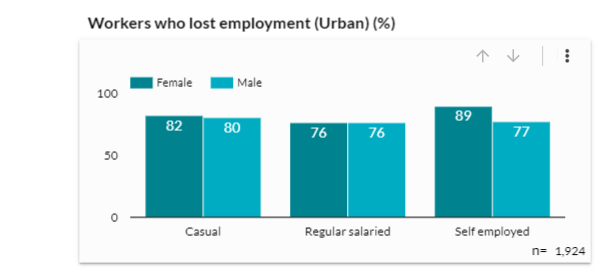About 66% Workers Lost Employment During Lockdown: Study

The COVID-19 pandemic and the nationwide lockdown imposed on March 24 have taken a heavy toll on the economy; particularly, on the vulnerable informal and migrant workers and their families. A study by the Centre for Sustainable Employment has found that 66% of workers have lost their employment during the lockdown.
If looked at data specific to urban and rural spaces separately, the study said that 80% of the workers have lost their employment in urban areas. In rural areas, it adds up to 56%.
The results of the study also show that the percentage of the female workforce is much more affected than the male workforce. In urban areas, 82% of female workers have lost their casual jobs as against 80% male workers. In the case of the workers who had regular salaried jobs, 76% of both women and men workers have lost their jobs. While 89% of self-employed women workers have lost their jobs in urban areas, 77% men have lost their jobs in the same category.


Since the lockdown, 77% households are consuming less food than before. This rate is high in urban areas with 83%; in rural areas, it is 73%. In total, 77% of the vulnerable households have received ration and 49% households have received cash transfer. Data are from the state-level survey results based on a total sample of 5,000 interviews across 12 states: Karnataka, Madhya Pradesh (Rural), Odisha, Rajasthan, Jharkhand (Rural), Telangana (Rural), Maharashtra (Pune), Gujarat, Andhra Pradesh (Rural), Delhi (Urban), West Bengal (Rural), and Bihar (Rural).
Read more: Migrant Workers Crisis Exposed Insensitivity and Ignorance of Govt Towards Poor, Say Trade Unionists
Though the survey is still underway, these sets of data were collected between April 13, and May 20 at different times in various states.The survey measured levels of employment and earnings since after the lockdown was imposed and compared them to the situation prevailing in February. It has included self-employed, casual, and regular wage/salaried workers.
If we further look into the state-wise data, in Gujarat, about seven out of 10 (71%) workers lost their employment. Urban workers are more severely affected with nine out 10 losing their employment during the lockdown. Meanwhile, 96% of regular salaried workers in urban areas lost their jobs.
Nearly nine in 10 farmers were not able to sell their produce at full prices and seven in 10 households did not have enough money for a week’s worth of essentials. The situation is worse in urban areas (89%).
To cope with the decrease in earnings, 95% of urban households reported reducing their food intake during the lockdown, while 85% of the vulnerable households received ration. However, 66% of urban households did not receive any cash transfer compared to 51% rural households.
In Rajasthan, where 484 respondents have been surveyed so far, nearly nine in 10 (88%) workers reported losing their employment. Casual wage workers in urban areas were the worst-hit with 95% losing their jobs and 68% of salaried workers not being paid salaries or receiving only partial payments, said the study. Three in 10 migrants working in urban areas of the state did not have a ration card. Nearly four in 10 vulnerable households in the urban areas received no cash transfers.
In the national capital, 73% lost employment during the lockdown. The average earnings of non-agricultural self-employed and casual wage workers fell by 63%. Here, more than half of the vulnerable households did not receive ration, while nearly seven in 10 migrants did not receive ration. Seventy-three per cent of vulnerable households did not receive any cash transfer.
The other states too where the survey was conducted had similar stories to tell. Overall, the survey finds that the disruption in the economy and labour markets of the surveyed cities and states is enormous. Livelihoods have been devastated at an unprecedented level during the lockdown. The recovery from this could be slow and very painful. Along with this, we should note that many people have no access to the public distribution system.
The team which has conducted the study suggests some measures: “A universalisation of the PDS to expand its reach and implementation of expanded rations for at least the next six months; Cash transfers equal to at least Rs. 7000 per month for two months. From a macroeconomic perspective as well, larger transfers are needed to bring back demand in the economy; Opening up of MGNREGA sites in keeping with physical distancing norms is urgently needed; Proactive steps like expansion of MGNREGA, introduction of urban employment guarantee, and investment in universal basic services are needed; Investment in universal basic services are needed.”
Read more: Over 70% MSMEs Intend to Reduce Workforce: AIMO Survey
Get the latest reports & analysis with people's perspective on Protests, movements & deep analytical videos, discussions of the current affairs in your Telegram app. Subscribe to NewsClick's Telegram channel & get Real-Time updates on stories, as they get published on our website.
























